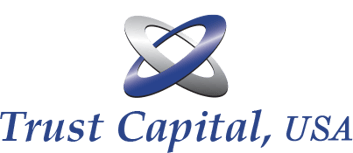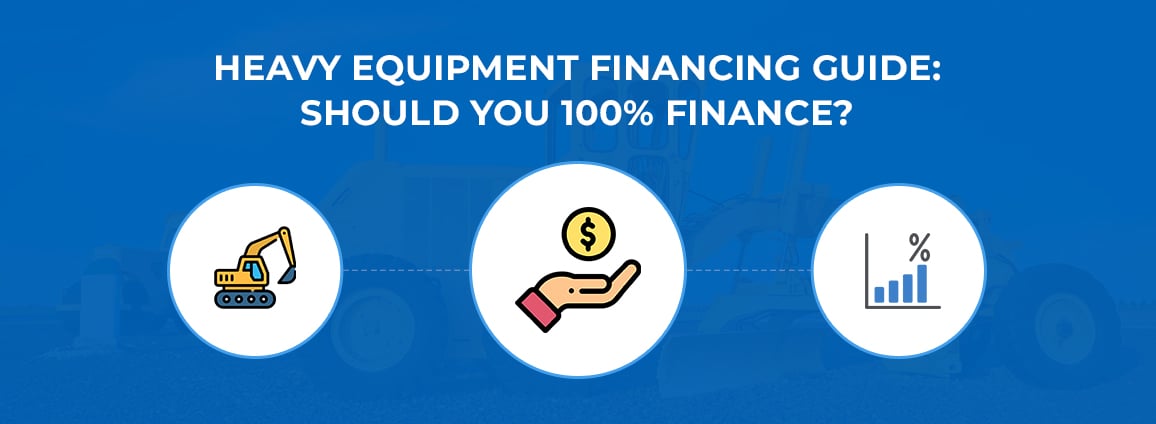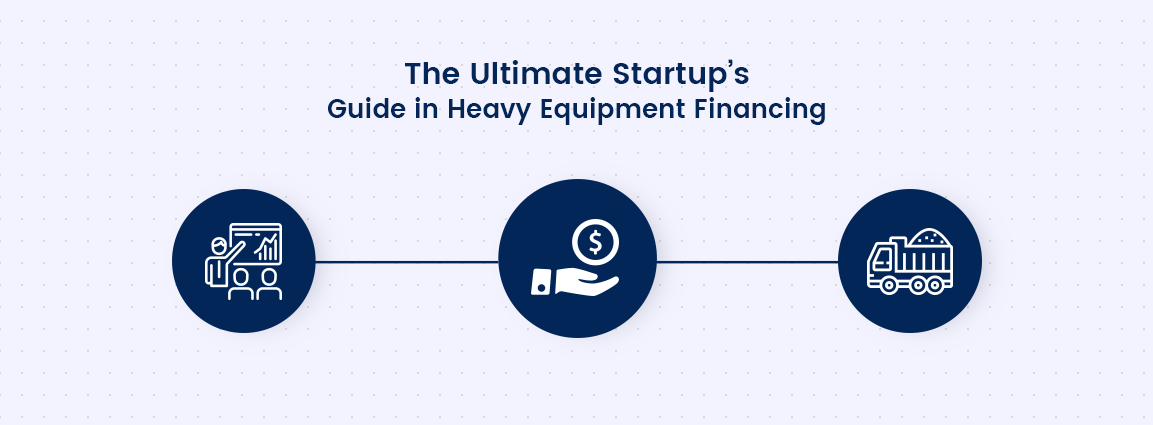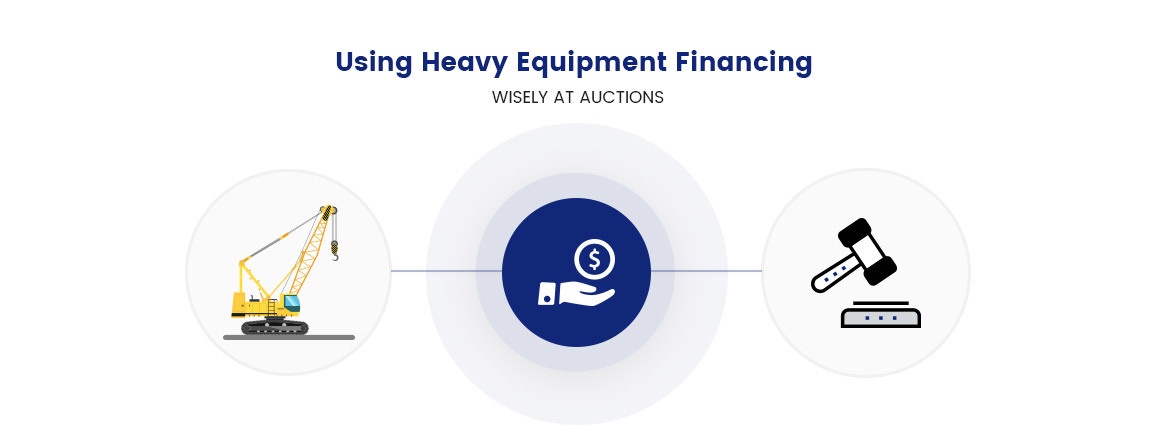Heavy equipment financing is a great option for businesses in the construction industry to purchase large, expensive pieces of machinery without paying the full amount upfront. However, there are important considerations to make when financing heavy equipment, such as choosing to finance 100% or partially, the type of financing (lease or loan), credit score, cash flow, down payment, and costs and terms.
To qualify for heavy equipment financing, businesses usually need to have a good credit score (above 600) and at least one day in business. However, if the credit score is not good, the business revenue may still allow the business to qualify based on cash flow. In some cases, a down payment on the equipment may also help secure financing. It's important to note that a lower credit score may still result in loan approval, but with a higher interest rate. Improving the credit score (above 650) before applying for financing may help secure better terms. Such as terms up to five years with no pre payment penalties.
Here are the steps you need to take to apply for heavy equipment financing:
- Establish creditworthiness: Heavy equipment lenders will want to see that you have a good credit history and financial stability. You can do this by obtaining a credit report and fixing any errors. Equipment lenders look for five plus open trade lines on your credit report and installment debt history of at least fifty percent of the asking loan price. They like to see that you have at least a two year payment history on installment debt as well.
- Determine the loan amount needed: You need to have a clear understanding of the amount of money you need for the heavy equipment you want to purchase. Equipment lenders will give you a pre approval so you can go shopping up to the amount of money you request. You can even take this pre approval to auctions to buy heavy equipment.
- Gather financial documents: If your request is over $500,000 then you'll need to provide the lender with financial statements, tax returns, and other financial documents to support your loan application.
- Submit a loan application: Submit a complete and accurate loan application. Most heavy equipment finance companies will approve you application only up to $500,000
- Wait for approval: The lender will review your application and, if approved, will provide you with the loan terms and conditions. This process is generally fast and decisions are made in 2 - 4 hours.
- Close the loan: Once you have agreed to the terms, you can close the loan and the lender will purchase the heavy equipment so you can go pick it up. This process typically takes 1 - 2 days.
To lease, or to finance? That is the question…
The choice between heavy equipment leasing or financing heavy construction equipment depends on the business's needs and goals. Heavy equipment leasing is similar to equipment rental, where the business pays a monthly fee for the right to use the equipment. At the end of the heavy equipment lease term, the equipment can either be returned to the vendor or purchased, or in some cases, a $1 buyout lease option is available. On the other hand, a loan effectively makes the business the owner of the equipment, which will show up on the business's balance sheet. At the end of the loan term, the business is the outright owner of the equipment. Heavy equipment finance companies will place a UCC filing on your equipment for the duration of the loan or lease. For heavy-duty construction equipment that can last for many hours of work, a loan may be a more cost-effective option compared to leasing, which is popular for equipment that quickly becomes outdated.
The cost and terms of heavy equipment loans vary based on the lender and type of financing. Credit score, cash flow, down payment, and the length of the loan term can all affect the cost and terms. Heavy equipment loans typically come with low interest rates, long repayment terms, and flexible repayment options.
While heavy equipment financing can be a great option for many businesses, it's important to weigh the pros and cons of 100% financing. 100% financing has the benefit of not requiring an upfront payment, preserving cash flow, and providing access to the latest equipment. However, it also has the drawbacks of a higher overall cost, increased debt, and decreased ownership of the equipment.
In addition to these factors, there are some other factors to consider when financing heavy equipment, such as the market demand for the type of equipment you need and the future prospects for your business. It's important to take a long-term view when making a decision about heavy equipment financing, considering factors such as the economic conditions and the overall growth of the construction industry.
Furthermore, it is essential to understand the different types of financing options available for heavy equipment. For example, some lenders may offer specialized heavy equipment financing options for specific types of construction equipment, such as earthmoving equipment or concrete equipment. It's also important to consider the terms of the financing agreement, including the interest rate, repayment period, and any penalties for early repayment or late payments.
One of the most important considerations when financing heavy equipment is the type of financing. A loan, for example, is ideal for businesses that are looking to build equity and maintain ownership of their equipment. In this type of financing, you take out a loan to pay for the equipment and repay it over a set period of time, usually with a fixed interest rate. This option gives you the advantage of having full ownership of the equipment, which means you can use it as collateral for future loans or sell it for profit.
Heavy equipment leasing, on the other hand, is a more flexible financing option, especially for businesses that don't want the commitment of owning the equipment long-term. With leasing, you rent the equipment from a lender for a set period of time and make regular payments. At the end of the lease term, you can choose to buy the equipment for its fair market value, return it to the equipment lender, or lease it again for another term. This type of financing is often more cost-effective for businesses that don't need the equipment for an extended period, as it eliminates the need for upfront payments, reduces maintenance costs, and allows for more flexible payment terms.
Another added benefit of leasing heavy equipment is the option of a $1 buyout lease. This option allows the business to have the option to purchase the equipment at the end of the lease term for just $1, instead of its full market value. This can be especially advantageous for businesses that are unsure if they will need the equipment in the long-term, as it provides the flexibility to purchase the equipment without the financial commitment. Additionally, the $1 buy out option allows businesses to take advantage of the benefits of leasing, such as reduced upfront payments, reduced maintenance costs, and flexible payment terms, while still having the option to own the equipment in the future.
When choosing between a loan and lease, it's important to consider the length of time you need the equipment, the cost of the financing options, and the business's financial goals. While both options have their advantages, the right choice depends on the unique needs of your business.
In addition to choosing between a business loan or heavy equipment lease, it's important to consider the costs and terms of the financing. These include the interest rate, repayment terms, and any penalties or fees associated with the financing option. It's essential to do your research to find the best deal for your business. Factors such as your credit score and credit history can play a role in determining the interest rate and repayment terms.
Should You 100% Finance?
One financing option to consider is 100% financing, which enables businesses to finance the entire cost of the equipment without making an upfront payment. This option can help preserve cash flow, provide access to the latest equipment, and improve your business's overall efficiency. However, it's essential to consider the pros and cons of 100% financing. For example, while it can provide improved cash flow, it also means taking on more debt, which can impact your business's financial stability in the long run.
Ultimately, the goal of heavy equipment financing is to provide your business with the equipment it needs to succeed. Whether you choose a business loan or a heavy equipment lease, it's important to compare the costs and terms of each option, understand the requirements and qualifications, and look for a lender that fits your specific requirements. By considering all of these factors, you can make an informed decision that will benefit your business in the long run.
There is also the option of a TRAC lease where you can put a balloon payment of 10-20% at the end to keep your payments low and have a predetermined buy out at the end of your lease.
As a business owner, you always have to weigh the benefits and drawbacks of each financial decision. 100% financing is a popular option for many businesses, as it allows you to avoid making a large upfront payment and free up capital for other business expenses. However, it also means that you'll be paying interest on the entire cost of the equipment, which can increase the overall cost and impact your business's financial stability in the long run.
Another important factor to consider is the cost and terms of the financing option. Heavy equipment loans generally come with low interest rates, long repayment terms, and flexible repayment options. However, it's still important to compare the costs and terms of each option to determine which is best for your business.
Weigh your options, make an informed decision
In conclusion, heavy equipment financing can be a cost-effective solution for businesses in need of construction equipment. Whether you opt for a loan or a lease, it's important to understand the costs, terms, and requirements associated with the financing option you choose. Be sure to compare the costs of each option, consider your business needs, and look for a lender that fits your specific requirements. With the right business financing option, you can provide your business with the equipment it needs to succeed.
Trust Capital, USA can help your business navigate through the best financing options to meet your company’s goals. Call us toll free at (866) 458-4777, or visit our website to apply for financing today!


 (866) 458-4777
(866) 458-4777

 Paul Kendall
Paul Kendall







